Imagine you go to a concert to see a classic band perform their greatest hits. However, the band only performs some of their best-known songs, and many of those are in unusual arrangements. How many songs does the band have leave out, and how strangely do the familiar songs have to be performed, before you ask for your money back?
Perhaps that’s a harsh way of putting it, but for me this question hangs over the recent BBC adaptation of H. G. Wells’ novel The War of the Worlds. Before I try to answer it, a bit of context is needed.
The Coming of the Martians
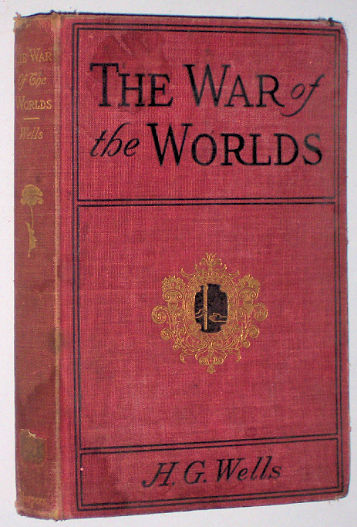 The War of the Worlds was first published in 1898 (the
BBC version moves the setting to the Edwardian period, between 1901 and 1914 or
so). It is a classic of science fiction, and one of the genre’s most important
novels. In it, and in The Island of
Doctor Moreau, The Time Machine, The Invisible Man and The First Men in The Moon, Wells not
only told inventive stories, but helped to set out the paths that much later SF
would follow. Wells was broadly “progressive”: he was interested in science and
Socialism, and disliked classism, militarism and the stranglehold of religion
on society.
The War of the Worlds was first published in 1898 (the
BBC version moves the setting to the Edwardian period, between 1901 and 1914 or
so). It is a classic of science fiction, and one of the genre’s most important
novels. In it, and in The Island of
Doctor Moreau, The Time Machine, The Invisible Man and The First Men in The Moon, Wells not
only told inventive stories, but helped to set out the paths that much later SF
would follow. Wells was broadly “progressive”: he was interested in science and
Socialism, and disliked classism, militarism and the stranglehold of religion
on society.
The War of the Worlds tells the story of an attempted Martian invasion of Great Britain (and presumably Earth). The Martians land in south-east England in huge cylinders and wreak havoc as they close in on London. The Martians use enormous three-legged fighting machines (perhaps the first mech suits in literature!) and, despite the brave attempts of the army, they appear unbeatable, until they are defeated in a surprise ending. The story is largely told “on the ground”—i.e. by frightened normal people—and lacks the square-jawed heroics one might expect from Victorian popular fiction.
The War of the Worlds is also very short and has the jumbled, slightly plotless feel of reportage from a warzone. It lacks deep characterisation or a climactic showdown. Almost all the characters don’t even have names. As a result, the most famous interpretations have all felt the need to alter or pad out the rather thin story.
Same Story, Different Versions
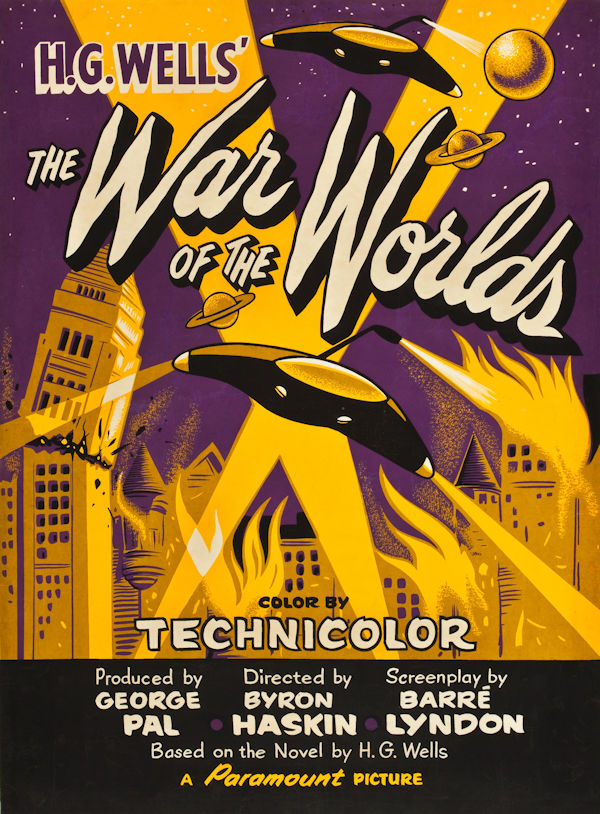 I can think
of several “big” interpretations that are useful comparisons with the BBC
version. I’m going to leave out the notorious 1938 Orson Welles adaptation,
because I don’t know it well. First, there’s the 1953 film, produced by George
Pal, which makes the tripods into flying saucers and transfers the action to
(then) modern America.
I can think
of several “big” interpretations that are useful comparisons with the BBC
version. I’m going to leave out the notorious 1938 Orson Welles adaptation,
because I don’t know it well. First, there’s the 1953 film, produced by George
Pal, which makes the tripods into flying saucers and transfers the action to
(then) modern America.
Then there’s the 1978 rock-opera made by Jeff Wayne. This is quite a faithful retelling of Wells’ story, albeit in prog-pop songs, with its original setting and characters. For many people, at least in the UK, it’s the definitive version. However, some may find the primitive synthesisers and chirpy music rather kitsch.
In 2002, Alan Moore and Kevin O’Neill covered the Martian invasion in the second book of their League of Extraordinary Gentlemen series. The League, consisting of Mr Hyde, the Invisible Man and other time-appropriate super-figures, fight the Martians in parallel to the events of Wells’ story. This version is notable for its excellent tripods and dark explanation for the defeat of the Martians, although the story does go to some very strange places along the way.
 In 2005, Steven Spielberg made a version starring Tom Cruise. It moved the action to the present-day USA and was surprisingly bleak in its violence and tone (as is the original novel). However, it introduced a dull subplot about the hero’s parenting ability, and had a number of plot holes.
In 2005, Steven Spielberg made a version starring Tom Cruise. It moved the action to the present-day USA and was surprisingly bleak in its violence and tone (as is the original novel). However, it introduced a dull subplot about the hero’s parenting ability, and had a number of plot holes.
No matter which version you’re watching, you can be sure you’re seeing something that wasn’t in the book. The fact is if you want to make a version of The War of the Worlds that will show the whole story of the invasion and won’t just stop dead towards the end, you have to include new material, whether in the form of subplots, additional characterisation or extra epilogues (or songs!). The question is—how?
Back To Now (i.e. Then)
The BBC adaptation tells of George (Rafe Spall) and Amy (Eleanor Tomlinson). George, a journalist, has left his wife to be with Amy—the marriage seems to have failed—but, as his wife refuses to divorce him, they are “living in sin”, which at that time carried considerable stigma. Amy helps Ogilvy (Robert Carlyle), an astronomer, and assists in the discovery of the Martians.
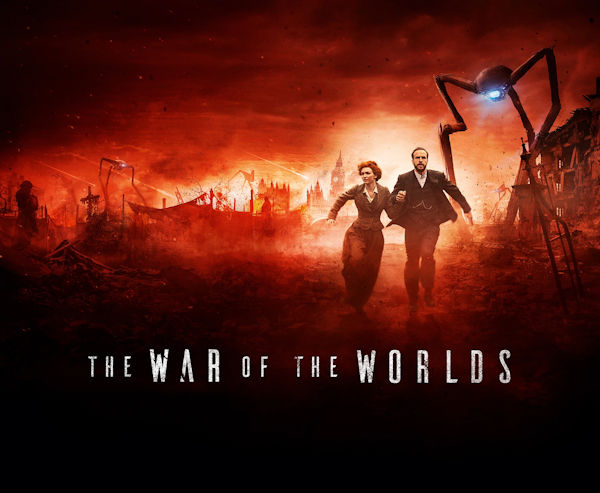
The divorce subplot is well-acted and well-portrayed but feels superfluous. In a drama like Downton Abbey, it would be interesting and apt, but my main response was to think, “But this won’t matter when the Martians wreck everything!” Clearly, the narrator needs some fleshing-out as a character from the novel, and similar events happened in Wells’ own life. But I wonder why the writers didn’t focus on one of Wells’ other experiences. Making George a Socialist, or an ardent scientist, or a campaigner for universal suffrage, could have broadened his character in a more interesting way in keeping with the setting.
George and Amy are caught up in the initial destruction caused by the Martians, and flee with George’s brother (Rupert Graves), a government minister, who first provides information about the wider world, and then becomes a sort of belligerent survivalist, contrasting with the weaker, gentler George. Their adventures roughly mirror those of the narrator and his brother in the book—with a couple of major omissions.
There’s also a subplot involving what happens after the Martians are defeated, in which Amy looks for George in an ecologically ruined Britain. These parts, which raise the grim issue of climate change without being preachy, are both really interesting and a bit weak. They feel a little cheaply made, and involve a lot of talking, but it’s good to see an adaptation that doesn’t end with everything instantly being fine again. Wells himself raises the question of what happens next in his novel, and this is one way of answering it.
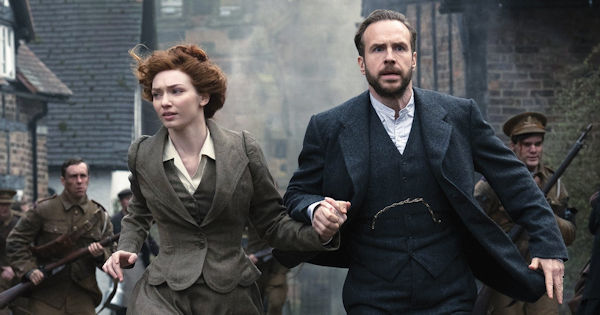
The BBC version downplays, changes or leaves out some of the most important moments in the novel. The battle between the tripods and a British dreadnought is much truncated, and the narrator’s confrontations with a crazed curate and a deluded artilleryman are left out entirely. What we get instead is perfectly watchable, but I’d go back to the question I asked at the start: How much of the story can be changed before it’s no longer the same story at all?
Someone Else’s Story
It seems to me that in adapting a book like The War of the Worlds, two things have to be taken into account: spectacle, and subtext. The spectacle of The War of the Worlds is obvious: Martians arriving on Earth, fighting the army in their tripods and laying waste to the countryside. By subtext, I mean the social and philosophical ideas that Wells uses the Martian invasion to discuss.
I think the BBC version was a fair attempt at both. But both could have been much better. I can understand the details of the Martians and their weaponry might have been cut and simplified for budget reasons, although it feels a shame not to depict them accurately. But I can’t see why the scenes with the artilleryman and the curate had to go. Not only are they crucial to the arguments Wells made in his book (particularly the portrayal of religion through the curate and the book’s narrator), but they would have been pretty cheap to film and would have added drama to what was a fairly slow third act.
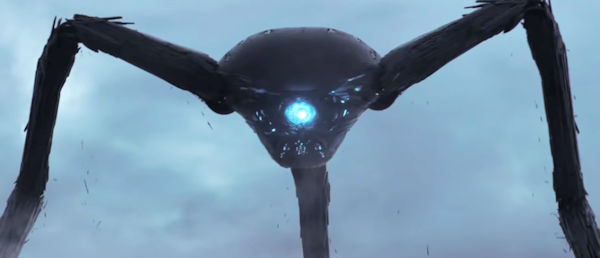
Towards the end of the BBC adaptation, I decided that George and Amy weren’t the narrator of the novel, but other people whose stories ran in parallel to theirs. It seemed the best way to appreciate the virtues of the BBC version was to distance it from the original, which isn’t a good thing.
Ultimately, I’m going to give this adaptation 6/10, but that is very much a personal decision. If you wanted to see the tripods, the landing craft and even the Martians themselves depicted exactly as Wells described them, you’ll be disappointed. It’s well-acted and looks good. However, despite the setting of Victorian/Edwardian Britain, and the bold attempts to look at the story from a new angle, this isn’t the definitive adaptation that I’d hoped for.


“How many songs does the band have leave out, and how strangely do the familiar songs have to be performed, before you ask for your money back?”
Toby, with this question you addressed exactly the problem I had with this series but couldn’t pinpoint. I feel I would have enjoyed it much more if it didn’t come with the “War of the Worlds” tag, because I kept expecting to see familiar scenes and plots.
I also thought that they tried to put too much into just 3 episodes…
Yes, too much and yet not quite enough! I can understand them wanting to have their own take on it, but I think it was missing too much of the stuff that makes the book good. Rather a missed opportunity.